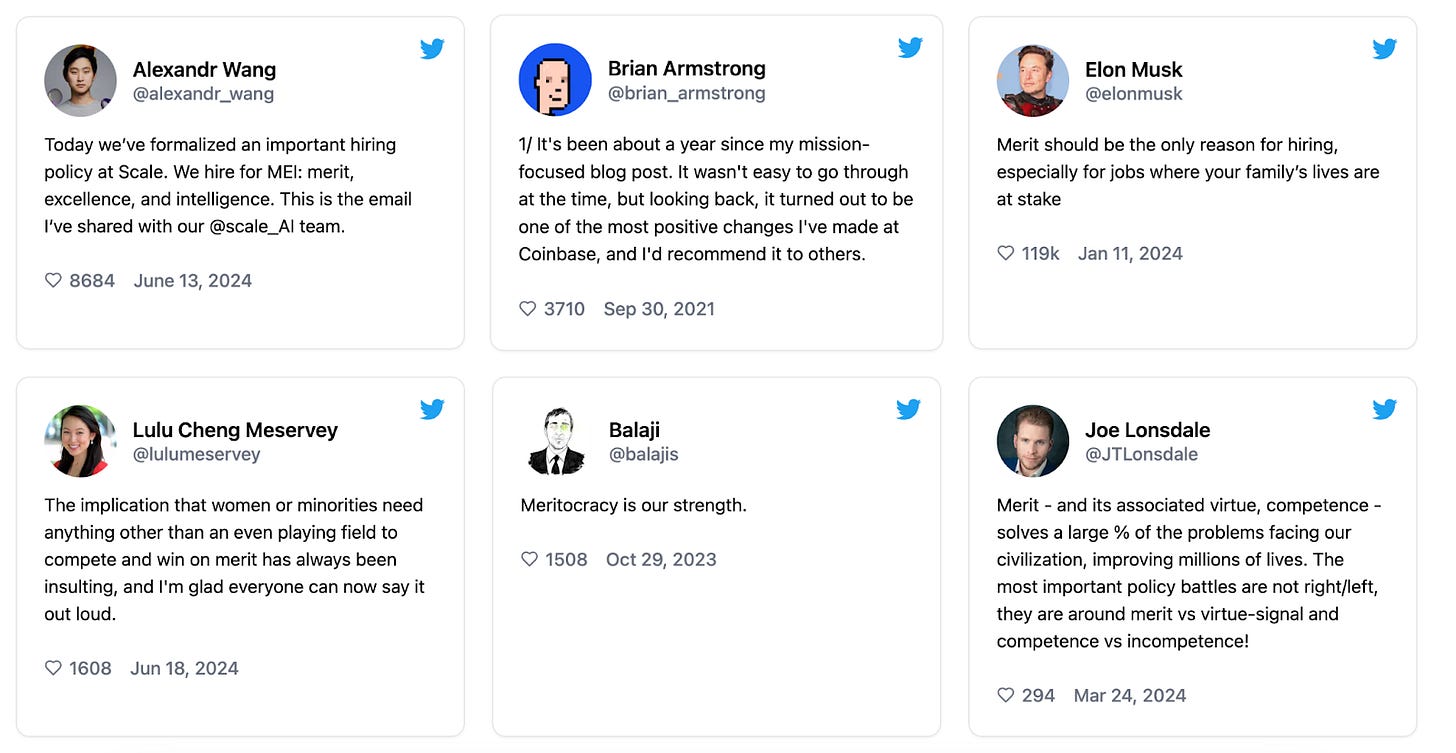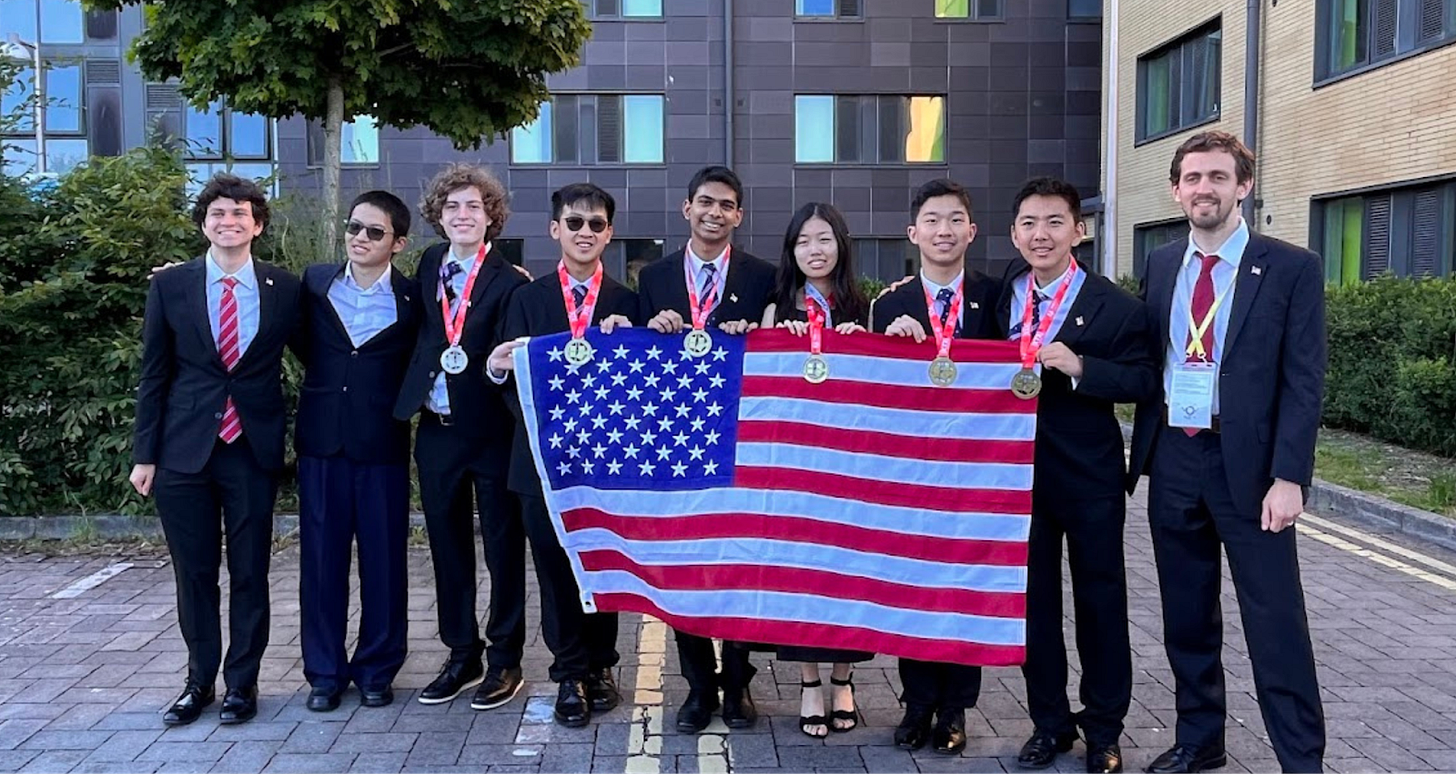Meritocracy Is All You Need
The Tech Right Is Simpler Than You Think
Silicon Valley’s rightward shift is explained by one word: meritocracy.
When it comes to politics, tech was a sleeping giant.
For decades, it rested. Founders, investors, and engineers worked tirelessly towards a singular focus: starting and operating their company. That’s what it took to reach the top. Silicon Valley built its culture on that foundation. There was no room for politics in a founder’s tight schedule. The giant slept for a very good reason.
You would think that succeeding in a high-stakes free market made technologists a natural Republican constituency. But until recently, that singular focus on doing their job placed a taboo on building a broader political movement. Being the most meritocratic founder meant staying away from politics that didn’t contribute to their company. If you cared about politics, it was a distraction. It was tribalism. It was actively hurting your abilities as a founder, executive, or engineer.
As top talent moved to San Francisco, it drained away from DC. Inevitably, DC came for Silicon Valley. Unable to cope with Hillary Clinton’s loss, it made social media the top scapegoat for Russiagate. For the first time, tech needed to defend itself.
Silicon Valley’s singular focus was a double-edged sword. It meant it lacked the intellectual foundation to argue for itself on ideological terms. It wasn’t that technologists lacked intellectual talent, but rather that political intellectualism was seen as a distraction. Lacking that foundation, it was only natural for tech to turn to appeasement of left-wing interests, as a short term self-defense strategy. Even though Trump was President, Big Tech would defend itself by signalling loyalty to left-wing social causes while playing defense on economic issues that would actually affect them.
That led conservatives to see Big Tech as a public enemy, censoring speech in favor of left-wing causes, often rightly.
Those of us who worked in tech all knew this was a ticking time bomb. Simply put, the hyper-autistic Silicon Valley culture was the furthest thing from the therapeutic performances of the social justice left. In some ways, technologists share more with revolutionary communists than DEI. You can call Stalin many things, but he was not complacent, soft, or boring. Even the Soviet Union and Communist China recognized scientific excellence. “From each according to his ability, to each according to his needs” assumes natural variation in ability, rejecting the blank slate DEI assumption.
As Trump was running for re-election in 2020, the George Floyd viral video sparked the mass proliferation of Diversity, Equity and Inclusion, which was a demand for racial quotas by any other name. You could call it disparate impact or diversity, but underlying it all was discomfort with the reality that when you picked the best candidates on merit, you would get different results for the NBA than for the International Math Olympiad.
San Francisco was a place where meritocracy was assumed in all walks of life, from your job to your friend group to the school your children would attend. DEI was an attack on standardized tests and public magnet schools for top students. Soft-on-crime policies created manifest disorder on San Francisco streets. Most importantly, DEI attacked Silicon Valley’s meritocratic hiring process – the golden goose that made all technology companies work.
In 2020, Coinbase CEO Brian Armstrong and Shopify CEO Tobi Lutke sent emails pushing back on these anti-meritocratic tendencies. Within these emails, you can spot the dawn of a new tech coalition. Both CEOs compared their companies to sports teams. Sports remains a unifying culture where all can agree we want the best of the best playing for America. This was not a propaganda tactic. It is the most sincere belief of technologists that unwavering excellence and unbreakable endurance are equally necessary to win an Olympic gold medal and to build a billion-dollar startup.
I cannot overstate how much this singular virtue influenced the political outlook of technologists I know, both ordinary and powerful. I would cleanly divide Silicon Valley’s political thinking into pre-DEI and post-DEI eras. That’s how much it mattered. Before DEI inserted itself into HR departments, founders would either ignore politics, or immediately forget about politics after delegating it to a lobbying firm. After DEI, the routine of singular focus was breached. Politics was now a determinative input into how well a company functioned. That meant founders had to deal with it themselves.
This realignment made both doing and speaking about politics more important. Founders discovered legal workarounds and hired top lawyers to protect their meritocratic hiring pipelines. They began forming concerted legal and political groups to rally around meritocracy. At the same time, it became more acceptable, even admirable, to speak about politics publicly. Housing, crime, education, anti-semitism on campus, and affirmative action all naturally fit into this framework. The oppressor versus oppressed victim mentality was leading far-left Democrats to ruin public spaces and persecute disproportionately successful Jews and Asians (who, as a result of their success, are highly represented in the tech elite).
Silicon Valley has a densely connected network for responding to crises, from market crashes to global pandemics. Once defending meritocracy was looped into that network, the organizational efficiency of that network set into motion a broader defense of tech’s political interests. This is where I disagree with more evenly-spread analyses of the tech right, such as my colleague Jon Askonas’ “Tech for Trump”. To be fair, self-interest, antitrust, and industrial policy all matter to some degree. They may become even more important to the politics of the tech right in the future. But they do not matter equally.
Having watched it happen, I do not believe the tech right would exist today without DEI’s attack on meritocracy.
Deep Fissures
Meritocracy unifies tech. Trump splits it.
There’s a reason why Biden’s utterly incompetent debate performance, paired with Trump’s attempted assassination and response, worked as a unique rallying point for tech endorsements. These included a16z’s Marc Andreessen and Ben Horowitz, 8VC/Palantir’s Joe Lonsdale, Pershing Square CEO Bill Ackman, and Elon Musk. They joined earlier supporters David Sacks, Chamath Palihapitiya, and Shaun Maguire.
After the debate, Biden’s speech failures dominated top clips. At the same time, a Trump quote lit a subterranean fire in some tech circles:
I’ll tell you what happened, he was so bad with Afghanistan, it was such a horrible embarrassment, most embarrassing moment in the history of our country, that when Putin watched that and he saw the incompetence that he should – he should have fired those generals like I fired the one that you mentioned, and so he’s got no love lost. But he should have fired those generals.
Afghanistan epitomized tech’s meritocratic critique of the Democratic party: that they had become so sclerotic and corrupt that connections, seniority, and DEI mattered more than getting the job done, leading to an endless parade of geopolitical and domestic failures. The failure of the Secret Service to prevent the Trump assassination attempt from injuring him added fuel to the fire. Combine that failure with the initial refusal of Secret Service director Kimberly Cheatle to resign amidst their DEI campaign, and the contrast between meritocracy and the administrative state never seemed clearer.
But Cheatle resigned, and so did Biden. And that marked the end of the tech right’s honeymoon.
Meanwhile, Silicon Valley’s culturally left-wing and academic roots continued to leave a chasm between them and the personality of Trump that has made him so popular with working class voters. As the majority of tech workers continue to see it, Democrats are the party of policy wonks, academics, career professionals, and people who actually read the news. Biden stepping down and endorsing Vice President Kamala Harris provided a perfect opportunity to make that argument. As Reid Hoffman, founder of Linkedin and major Democratic Party donor put it in his endorsement of Harris: “The Democrats are the party of policy, progress, and action.” To them, Trump is the candidate of disorder and incompetence. VCs for Kamala’s announced a similar message in the public launch.
The “absolute meritocracy” and “respect for academic institutions” narratives are not mutually exclusive. Computer science academia remains functional and meritocratic. Many of the most important machine learning breakthroughs came from academia. Remember, Reid Hoffman successfully built LinkedIn. He is someone who has accomplished more than 99.99% of the population. When it comes to meritocracy, he is not coming from a place of ignorance.
What is undeniable from either party is that Kamala represents a fortification of traditional Democrat voters. This bodes poorly for any kind of realignment, let alone one in deep blue Silicon Valley. While Biden may have chosen Kamala as his VP candidate because of her race and gender, it is undeniable that today, replacing Biden with her was the meritocratic choice.
Given everything we now know about Biden’s cognitive decline, making him the figurehead of everything that was wrong with “anti-meritocratic Democrats” was easy mode for the tech right. That’s no longer an option. Ousting Biden was a wellness check for the Democratic party, one that they eventually passed. I know individual Harris donors who make exactly this argument for Harris and have put their money behind it.
There’s some evidence Trump understands these critiques. He distanced himself from the religious right in the Republican platform, as well as from Project 2025 in his personal statements. He promised the All-In Podcast to attach visas to all students graduating from US colleges, addressing the key tech concern of legal immigration. The JD Vance pick is also a pick which helps reinforce a narrative of competence. “He’s a gray tribe pander pick” Julie Frederickson tweeted, referring to silicon valley’s third way political beliefs.
What’s Next
For now, the tech right’s wave seems to have crested. The Democrats of the future may make it obsolete.
Biden’s senility will be a permanent memory for the Democratic party elite, even more so once he is no longer President. Youth will matter in the 2028 Democratic primary. It might be Reid Hoffman, Reed Hastings, and Michael Bloomberg’s time to shine, remaking the Democratic party into a meritocracy which deserves to hold on to Silicon Valley’s support.
Who am I kidding? I don’t think one near-death experience is enough to reverse over 100 years of oppressor-oppressed thinking. I don’t think the DEI, anti-semitism, or economic grievance will stop. But as Harris is demonstrating, even purely aesthetic changes are enough to keep a hold on the supermajority of tech donors who continue to prefer Democrats.
On the other hand, if Republicans are the ones with a new candidate next election, many of the anti-Trump hangups may vanish over night. A JD Vance or Ron DeSantis (who David Sacks backed in the primary against Trump) may completely dispel the “chaos agent” concerns surrounding Trump.
For future historians, who tech meritocrats backed in 2024 might be nothing more than a footnote. The deep roots of the meritocracy network are growing. They will bring hundreds of millions of dollars. They will matter. They will move the politics of both parties. They already have.





Also as someone who worked for the big tech SV companies, there is nothing meritocratic there anymore. On average, out of 20 engineers, 2 meaningfully contribute to the company, 10 produce nothing for years and don't get fired, and eight are good at politics but not in coding and therefore get promoted.
There is a reason why Musk fired more than 50% of Twitter engineers and the product was unharmed.
In addition, majority of the executives in SV are extremely narrow minded and prefer quick money that comes from green scams to serious R&D investments.
Great post and I will share this with friends who want to know about the tech right. I think you got the nail on the head.
I gotta push back on Trump's "promise" on the all in podcast, which was indeed something he said, but not worth the bits it's encoded in:
> But hours after Mr. Trump’s remarks aired, his campaign’s press secretary, Karoline Leavitt, walked back the former president’s comments, saying in a statement that...the policy would apply only to the “most skilled graduates who can make significant contributions to America.”
https://web.archive.org/web/20240701180645/https://www.nytimes.com/2024/06/20/us/politics/trump-green-cards-college-graduates.html
While they both fit the meritocracy scheme, there's a huge difference between giving green cards out to all grads and "only the most skilled grads", which could mean anything from selecting a large % of the top students from all institutions to limiting the policy to CS PhD grads from the top five departments.